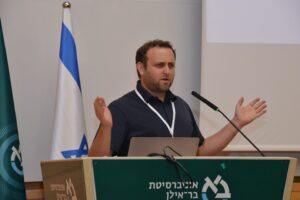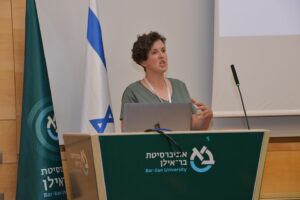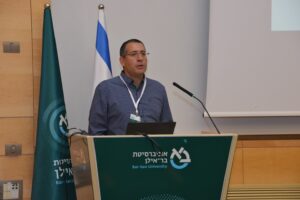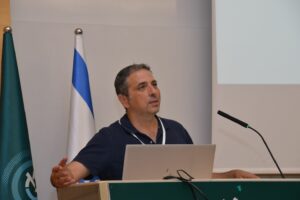
- This event has passed.
DSI Dinner – October 2021
October 28, 2021 @ 5:00 pm - 8:00 pm IDT

YES – DSI Dinners are back!!!
After over a year in which the BIU DS community did not gather face to face, this will be an opportunity for us all to meet, learn about recent research activities and enjoy a dinner event.
We are excited to share with you the details of the TASHPAB Fall DSI Dinner event that will take place on Oct 28 2021 at the Nano conference hall BIU.
Agenda:
17:00-17:30: Gathering and refreshments
17:30-17:45: Opening notes (Prof. Ido Dagan)
17:45-18:30: Selected talks by 2020 DSI grant recipients –
Dr. Rose Stamp (English Literature and Linguistics) – The Israeli Sign Language (ISL) Corpus
Dr. Alon Raviv (Business Administration) – Trends and Events in Business and Economics: A Text-Mining Approach
Prof. Yoram Louzoun (Mathematics) – On Predicting the effect of the perturbation on the human microbiome for therapeutic intervention
18:30-19:00: Guest Speaker – Dr. Dvir Aran (Biology, Technion)
19:00-20:00: Poster Session and Dinner (see below)
Registration
Please register in the following form (important! as we need to know the expected number of attendees in advance to properly plan the catering and other logistics):
https://dsi.biu.ac.il/dsi-dinner-2021-registration
Looking forward to seeing you all.
Posters Presentations:
| PIs | Title | Presenter | |
| 1 | Ayelet Sela and Ittai Bar-Siman-Tov | RISKY FINE PRINT: A NOVEL TYPOLOGY OF ETHICAL RISKS IN MOBILE APP USER AGREEMENTS | Bar Fargon Mizrahi |
| 2 | Ramit Mehr | IgTreeZ: A toolkit for immunoglobulin gene lineage tree analysis | Hadas Neuman |
| 3 | Vadim Axelrod and Baruch Barzel | Functional connectivity variability across conscious states and brain networks | Noam Somech |
| 4 | Yoav Goldberg | Measuring and Improving Consistency in Pretrained Language Models | Yanai Elazar |
| 5 | Yaron Michael and Itamar Lensky | Forecasting fire risk with machine learning and dynamic information derived from satellite vegetation index time-series | Yaron Michael |
| 6 | Amiyaal Ilany | Do rock hyraxes need a database? | Amiyaal Ilany |
| 7 | Dana Atzil-Slonim and Yoav Goldberg | Hebrew Psychological Lexicons | Natalie Shapira |
| 8 | Yoav Goldberg, Reut Tsarfaty and Ido Dagan | Asking It All: Generating Contextualized Questions for any Semantic Role | Valentina Pyatkin and Paul Roit |
| 9 | Reut Tsarfaty | Morphological Inflection in Georgian: Annotation and Reinflection with Multiple Arguments | David Guriel and Omer Goldman |
| 10 | Reut Tsarfaty | (Un)solving Morphological Inflection: Lemma Overlap Artificially Inflates Models’ Performance | David Guriel and Omer Goldman |
| 11 | Ido Dagan | CDLM: Cross-Document Language Modeling | Avi Caciularu |
| 12 | Ido Dagan | iFᴀᴄᴇᴛSᴜᴍ – Coreference-based Interactive Faceted Summarization for Multi-Document Exploration | Eran Hirsch |
| 13 | Avi Shmidman | Real-Time Hebrew Vocalization: Majority Rules, But Not Always | Avi Shmidman |
| 14 | Oren Perez and Reuven Cohen | Network Compliance and the Regulation of Safety in Construction Accidents | Daniel Dayan and Assaf Ambar |
| 15 | Reut Tsarfaty | Draw Me a Flower: Grounding Abstract Structures in Executable Instructions | Royi Lachmy |
| 16 | Ittai Bar-Siman-Tov and Roy Gelbard | Where Did We Go Wrong? Empirical Research of Legislation Errors | Elhanan Schwarts |
| 17 | Reuven Cohen and Simi Haber | Shattering Random Graphs | Reuven Cohen |
| 18 | Yanay Ofran, Yoav Goldberg and Ron Unger | ProtClass: What makes a sequence of amino acids to be a protein? | Yaron Geffen |
| 19 | Hanoch Senderowitz | Implementation and Application of a Deep-Docking platform for the Virtual Screening of Large Collections of Drug-Like Compounds | Yair Frank |
| 20 | Reut Tsarfaty | AlephBERT: Pre-training and End-to-End Language Models Evaluation from Sub-Word toSentence Level | Reut Tsarfaty |
| 21 | Jonathan Rubin and Jonathan Schler | Automatic origin tracing in Burchard’s medieval manuscripts | Moshe Friedman |
| 22 | Oren Perez | Private-Public Mutuality in Transnational Law | Ofir Stegmann |
| 23 | Rose Stamp | Creating the first Corpus of Israeli Sign Language | Rose Stamp |
| 24 | Milana Frenkel-Morgenstern | COVID-19 drug repurposing database | Milana Frenkel-Morgenstern |
| 25 | Alon Raviv | The Effect of The Financial Crisis and Basel III on Risk Disclosure In Banks Financial Reports- A Textual Analysis | Avinoam Blum |
| 26 | Yoram Louzoun | Evaluation of the number of undiagnosed infected in an outbreak using source of infection measurements | Akiva Bruno Melka |
Dr. Dvir Aran
About the guest Speaker: Dvir Aran is an Assistant Professor at the Biology department at the Technion – Israel Institute of Technology.Speaker BIOs:
His current focus is split between computational immunology analyses using single-cell RNA-sequencing data; and applying machine-learning techniques on electronic health records (EHR) to improve patients’ flow and disease outcomes. Since the covid-19 pandemic, Dvir has conducted intensive research around covid with multiple publications in top peer reviewed journals as well as many notes and articles in the popular media on the subject (e.g. “To boost or not to boost?” recent commentary on COVID-19 boosters in Nature News.)

Dr. Rose Stamp
Dr. Rose Stamp is a Lecturer at the Department of English Literature and Linguistics, Bar-Ilan University, Israel. Her research focuses on language variation and change in established sign languages as well as newly emerged sign languages. In her current work, she takes a corpus-based approach to explore language contact in Israel, between multiple sign languages as well as between signed and spoken languages, with a special focus on multi-identity groups.

Dr. Alon Raviv

Prof. Yoram Louzoun (Mathematics)

Prof. Yoram Louzoun received his BSc in Mathematics and Physics from the Hebrew University of Jerusalem, his MSc in Astrophysics from Tel Aviv University and his PhD in Neural Computing from Hebrew University. He completed his postdoc at Princeton University in Immunology in the Department of Molecular Biology. He is currently the head of the Department of Mathematics, and a member of the Multidisciplinary Brain Research Center at Bar-Ilan University. He has a research lab in Applied Mathematics focusing on the research fields of Computational Immunology and Machine Learning. His lab is also involved in multiple large projects in microbiome analysis and graph-based machine learning.
